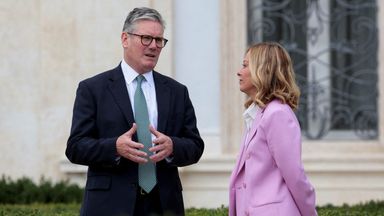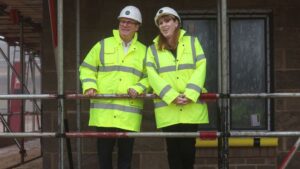Starmer to explore Albania migration deal as he meets Italian PM after appointing new border security chief
The deal Giorgia Meloni has struck with Albania will see Tirana accept asylum seekers on Italy’s behalf while their claims are processed.

Sir Keir Starmer is hoping to learn lessons from the right-wing Italian government today as he holds meetings in Rome with Giorgia Meloni about different plans to tackle illegal migration.
Italy has experienced a 60% drop in illegal migration across the Mediterranean Sea in the past year and has recently signed a controversial deal with neighbouring Albania.
It comes as the government finally announced its new lead Border Security Command, the former NPCC chair Martin Hewitt, who has travelled with Sir Keir.
Politics live: Starmer heads to Rome amid hints around Albania deal
The pressing need to stop small boats crossing was reinforced at the weekend when eight people died attempting to get to England from France.
Speaking ahead of the visit, the prime minister said: “No more gimmicks. This government will tackle the smuggling gangs who trade the lives of men, women and children across borders.
“Martin Hewitt’s unique expertise will lead a new era of international enforcement to dismantle these networks, protect our shores and bring order to the asylum system.”
Looking to curb migration to Italy, the Italian prime minister signed a deal with Albania last year to send some asylum-seekers to the Balkan country and process the asylum requests there.
Only those migrants who come from countries that Italy deems safe will be able to be processed in Albania.
Comparisons have been made with the scrapped Rwanda deal, however one key difference is that migrants sent to Rwanda would have needed to remain there even if they win refugee status.
Read more:
Italy’s ‘Guantanamo’: Inside the migrant centres in Albania
Eight dead after attempting to cross Channel
Is it really possible to ‘smash’ the smuggling gangs?
Speaking to reporters in Rome, Sir Keir pointed to the “quite dramatic reductions” in irregular migration to Italy since it announced the scheme, adding: “I want to understand how that came about.
“It looks as though that’s down to the upstream work that’s being done in some of the countries where people are coming from. I’ve long believed, by the way, that prevention and stopping people travelling in the first place is one of the best ways to deal with this particular issue.
“So [I’m] very interested to know how the upstream work went [and] looking, of course, at other schemes. I’m looking forward to my bilateral with the prime minister this afternoon, but we’ve already got a shared intent to work together on this trade, this vile trade, of pushing people across borders.”
Home Secretary Yvette Cooper also hinted to Sky News that the UK could be interested in a similar deal, though she insisted it was not akin to the last government’s Rwanda plan.
“We will be interested to see how [the Albania scheme] develops,” she told Kay Burley. “We’ve always said we would look at what works.
“The Rwanda scheme… was run for two and a half years by the Conservatives. They spent £700m on sending four volunteers to Rwanda. That is not a workable programme.
“The arrangements that Italy has with Albania is a very different one. It’s effectively around having a fast track for those who have arrived from predominantly safe countries and is also a scheme that is monitored by the UNHCR (United Nations Refugee Agency) as well to make sure that proper standards are in place and we will see how it develops.”
Pushed by Kay Burley on whether the government was considering the move, Ms Cooper added: “It’s not in place at the moment. So no, as we’ve always said, we will look at anything that works.
“But no, that’s not the scheme that we’re looking at at the moment.”
The controversial deal has yet to be fully implemented. Italy has however also struck financial deals with Tunisia and Libya – where most people depart from for Europe.
Shadow policy minister Matt Vickers attacked the prime minister for “ditching the deterrent” that he believed the Rwanda plan provided.
But, while he did not think the government would pursue an Albania-style scheme, he hinted the Conservatives would be open to it.
“I think we would look at any details that came forward… any deal that came forward,” he told Kay Burley.
“But in real terms, what we’ve seen from [Sir Keir’s] frontbench was suggestions that sending people out to Albania was unconscionable and that’s what his home affairs spokesman said to us… they said it was wrong.
“This is a guy who voted against everything we did to change the law and deport people somewhere.”
The PM’s visit to Italy is also part of a wider policy to “reset” the UK’s relationship with various European countries and follows on from trips to Berlin, Paris and Dublin.
Italy is a key UK ally, being a member of NATO, the G7 and an EU player and the UK’s 9th largest trading partner with bilateral trade flows worth over £50bn.
As well as migration, defence cooperation and Ukraine are also likely to feature in the talks.
But it is migration that will dominate, with the appointment of Mr Hewitt to lead the UK’s new Border Security Command viewed as a key test for the government.
Be the first to get Breaking News
Install the Sky News app for free


Hewitt is the former chair of the National Police Chiefs’ Council, a strategic coordination role, working with all of the UK’s police forces.
He said: “I am honoured and excited to lead this new and groundbreaking Command. I am under no illusions of the challenges that lie ahead, but I am determined to face them head-on.”


